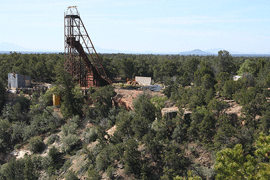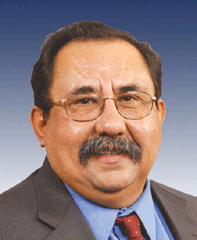Cracking the Hard Rock Mining Law
Air Date: Week of July 24, 2009

Orphan mine, an adandoned uranium mine below the South Rim at Grand Canyon National Park. There are thousands of new uranium mining claims near the Grand Canyon.(Photo: cogdogblog)
The hard rock mining law of 1872 was written during the Civil War to encourage development in the West. But more than 100 years later, mining companies can still dig up uranium, gold, and other minerals on public lands without paying royalties and without cleaning up. The Interior Department just placed a ban on new mining claims near the Grand Canyon. Arizona Congressman Raul Grijalva talks with host Jeff Young about his proposed legislation to make the ban permanent and about reforming the hard rock mining law of 1872.
Transcript
YOUNG: Hardrock mining is getting a closer -- and some say long overdue -- look.
The Obama administration has put a hold on some uranium mining claims near the Grand Canyon. And Congress might reform the law on hardrock mining— a law that’s been largely unchanged since 1872.
[MUSIC: Soundtrack & Theme Orch “The Good The Bad, The Ugly” from Themes In Cinema: Westerns (Countdown Media 2008)]
YOUNG: In 1872 Ulysses S. Grant was president. Mormon leader Brigham Young was arrested for polygamy - 103 wives in case anyone’s counting. And mining in the American west was wild and raw.
MOVIE SOUND: You see in this world, there’s two kinds of people my friend. Those with loaded guns and those who dig. You dig.
YOUNG: Well here to help us sort the good from the bad and the ugly on hardrock mining is Arizona Democrat Raul Grijalva.
Congressman, tell me about uranium mining claims near the Grand Canyon, how many are we talking about here?
GRIJALVA: Well we’re now up to 9000. And this began during the Bush administration where they excluded certain public lands from almost any federal law--excluded them from any real consultation with Native nations. And the consequence has been a rush to judgment. And so all these claims are of a speculative nature. And now we have a vein company and a couple of others that are beginning the drilling for testing and exploration with what they hope is a conclusion to begin to do uranium mining in and around the Grand Canyon.
YOUNG: Now tell me why uranium mining is of special concern and I guess, in telling that story we also have to talk a little bit about that legacy of uranium mining in your state and other western states.

Congressman Raul Grijalva. (Courtesy of the House of Representatives)
YOUNG: In this case is would be the Colorado River, right?
GRIJALVA: Exactly. Which millions upon millions of people in Arizona and Nevada and California are totally dependent on.
YOUNG: Now the Interior Secretary Ken Salazar has done what he calls a two year time-out here, and has withdrawn – what? – roughly a million acres here. Does that resolve the issue?
GRIJALVA: No it doesn’t. I think that the legislation that we’re promoting is a permanent fix of those million acres. A permanent removal from mining claims and mining activity. Period. But this was a vital step that Secretary Salazar took, in the million acres that are being withdrawn, because one of the things is to study intended and unintended consequences of mining. And I think this gives us two years at least to let science and fact dictate what the role should be in these public lands. And I think if we it in the hands of science and fact, we’ll be in good shape. But in the long run I think the permanent removal of those lands is the only solution that we have in front of us.
YOUNG: Now how does all of this relate to the larger effort to change the very old law on hardrock mining which dates back to – what? – 1872, is that right?
GRIJALVA: We wouldn’t be in this mess in the Grand Canyon. We wouldn’t be in this mess in other places across this country if we had reformed the 1872 law a long time ago. When it was put together it was to try to bring some economic development and growth on to the West. Well that’s already occurred. And mining represents less than four percent of the economic reality of the West.
The law of 1872 does not reflect what the West is now and Southwest is now. For example, no royalties. The only extraction activity that pays no royalties is hardrock mining. No royalties at all. No royalties for reclamation, no royalties for cleanup. You know natural gas pays royalties, oil pays royalties. And the centerpiece in this redefinition of mining law is gonna be the royalties and the public process.
YOUNG: Now some of your Republican colleagues counter that “hey, if we don’t get access to the minerals that we have, we’re just gonna put ourselves in a situation of being dependent on a foreign supplier of things like uranium and some of the metals that are essential to electronics engineering and many other products. How do you respond to that?
GRIJALVA: The discussion has never been about shutting the door. It has been about balance. Industry cannot have it their way. They have to understand that in the West people are looking for balance. They’re kinda of tired of the kinda of wide-open atmosphere that has been around for decades.

Orphan mine, an abandoned uranium mine below the South Rim at Grand Canyon National Park. There are thousands of new uranium mining claims near the Grand Canyon. (Photo: cogdogblog)
GRIJALVA: It’s a different process out there. We’re not quite sure what it is.
[LAUGHING]
GRIJALVA: But a lot of good things happen in the House and then end up in some black hole we never see again in the other chamber, this being one of them.
YOUNG: Is this year different?
GRIJALVA: No, it’s not going to be different. But I think the difference is the public. You know we’re in tough economic times and people are gonna have to ask themselves is it right for an industry that is this rich to get things out of the rest of us for free, i.e. hardrock mining. In Arizona, 64 percent of the voter believe those lands should be withdrawn around the Grand Canyon permanently. So using the Grand Canyon as the central symbol we can have a greater influence on the Senate than we have in the past. And I think, you know, the mining interests are very powerful because they’ve had a nice sweetheart deal, no cost deal on our public lands for years.
YOUNG: I’m gonna put you on the spot a little bit here because it seems to me that part of what goes on in the Senate has to do with the Senate Majority Leader Harry Reid being from the silver state, Nevada. And he’s not very fond of this reform effort. Do I read that correctly, and…?
GRIJALVA: You read it correctly. And you’re not putting me on the spot. I think that’s one of the points of contention. That’s a great deal of power that you’re dealing with there. You also have from my state Senator McCain. You have Senator Kyl, one of the leaders of the Republican caucus. So you know, it’s…we’re up against not only the industry but some very powerful representatives from mining states including Arizona that feel the status quo needs to be protected.
YOUNG: Congressman Raul Grijalva chairs the House National Parks Forest and Public Lands subcommittee. Thanks very much for your time.
GRIJALVA: Thank you for the invitation.
[MUSIC: Sly & Robbie “The Good, The Bad, the Ugly” from Mambo Taxi (Island Jamaica Jazz 1996)]
YOUNG: Just ahead: the pros and cons of conservation. Stay with us – on Living on Earth.
Links
Click here to learn more about hard rock mining near national parks and forests.
Living on Earth wants to hear from you!
Living on Earth
62 Calef Highway, Suite 212
Lee, NH 03861
Telephone: 617-287-4121
E-mail: comments@loe.org
Newsletter [Click here]
Donate to Living on Earth!
Living on Earth is an independent media program and relies entirely on contributions from listeners and institutions supporting public service. Please donate now to preserve an independent environmental voice.
NewsletterLiving on Earth offers a weekly delivery of the show's rundown to your mailbox. Sign up for our newsletter today!
 Sailors For The Sea: Be the change you want to sea.
Sailors For The Sea: Be the change you want to sea.
 The Grantham Foundation for the Protection of the Environment: Committed to protecting and improving the health of the global environment.
The Grantham Foundation for the Protection of the Environment: Committed to protecting and improving the health of the global environment.
 Contribute to Living on Earth and receive, as our gift to you, an archival print of one of Mark Seth Lender's extraordinary wildlife photographs. Follow the link to see Mark's current collection of photographs.
Contribute to Living on Earth and receive, as our gift to you, an archival print of one of Mark Seth Lender's extraordinary wildlife photographs. Follow the link to see Mark's current collection of photographs.
 Buy a signed copy of Mark Seth Lender's book Smeagull the Seagull & support Living on Earth
Buy a signed copy of Mark Seth Lender's book Smeagull the Seagull & support Living on Earth

